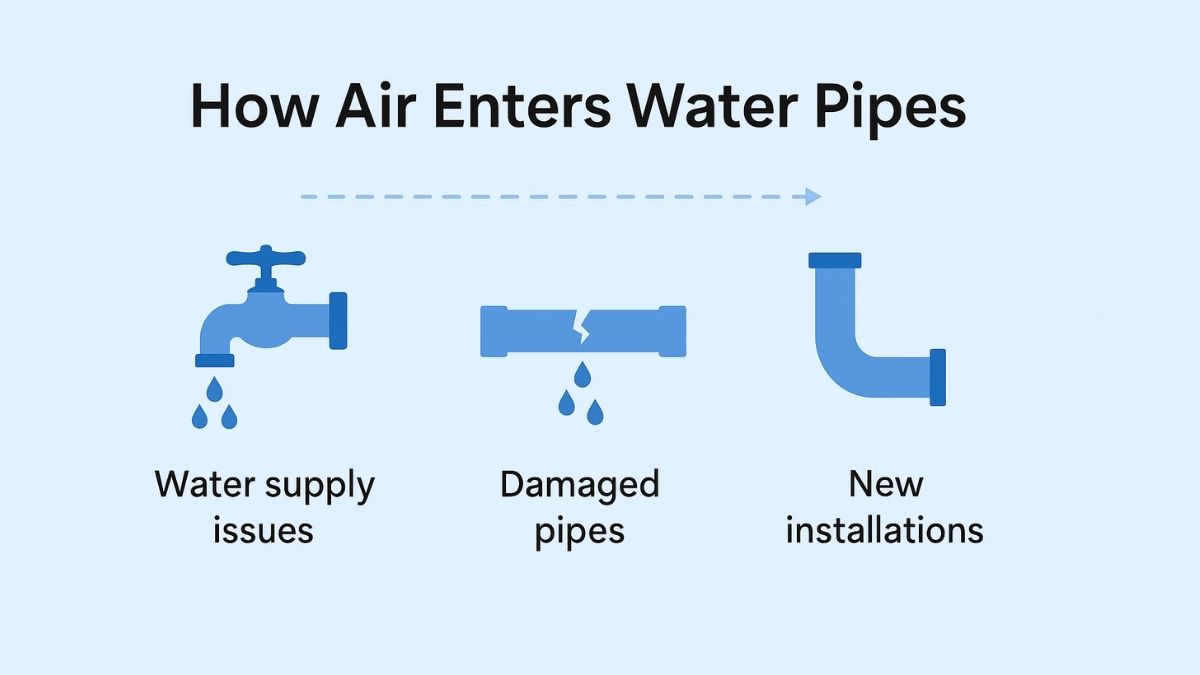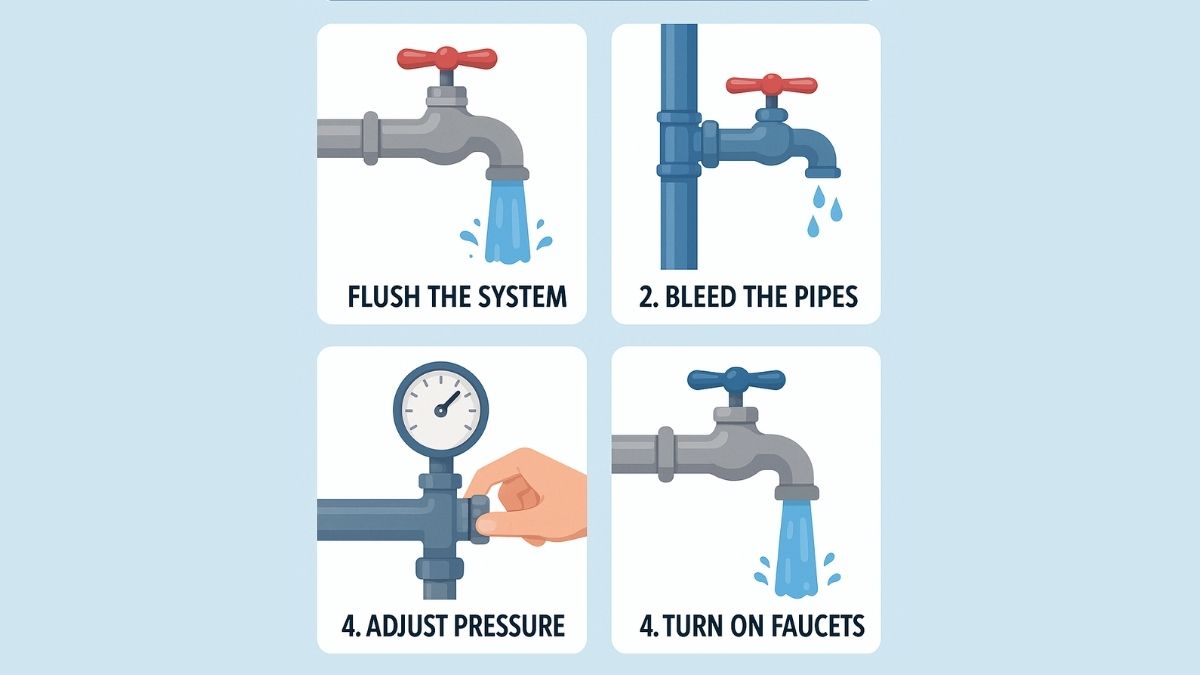When you hear strange sounds coming from your pipes or notice sputtering faucets, you might wonder, “What is causing all this?” The culprit is often air trapped in your water pipes.
Air in your water pipes may seem like a minor issue, but it can cause a lot of frustration. From noisy pipes and sputtering faucets to fluctuating water pressure, trapped air in the plumbing system can disrupt your daily life. If you’ve noticed these issues in your home, it’s essential to understand what’s causing them and how to remove the air effectively—whether through a DIY solution or by calling in the experts.
Understanding Air in Water Pipes
Air in water pipes occurs when air bubbles become trapped in the plumbing system, often causing inconsistent water pressure or unusual sounds when you turn on the tap. You might hear your pipes make gurgling or banging noises, especially when using water fixtures. While this may seem like a nuisance, understanding how air enters your plumbing system and how to fix it can help you restore smooth water flow and prevent more serious problems down the line.
3 Common Causes of Air in Water Pipes

There are several reasons why air may be trapped in your water pipes. Understanding the cause is the first step in resolving the issue. Here are the 3 most common causes:
Water Supply Issues
Sometimes, air in the water pipes is introduced by external factors such as problems with the water supply. These issues might include fluctuations in water pressure, especially during periods of high demand or maintenance work. Additionally, storms or seasonal changes in the water supply can cause air pockets to form in your pipes.
For more in-depth information on plumbing systems and how to improve water efficiency in your home, check out the EPA’s Water Efficiency resources. They offer some great tips, especially when it comes to managing water supply issues that can cause fluctuations in pressure.
Plumbing System Problems
In some cases, the problem lies within the plumbing system itself. For example, improperly installed pipes or damaged sections of the plumbing system can cause air to enter the lines. Cracked or loose connections, or even air gaps from poor installation, can trap air and result in noisy pipes and sputtering faucets.
New Plumbing Installation or Repair
If you’ve recently had plumbing work done—whether it’s an upgrade or a repair—air may have been trapped in the system. When new pipes are installed or repairs are made, air pockets can form before the system is fully flushed out.
How Air Affects Water Pressure and Quality
When air enters your water pipes, it can create a variety of problems, primarily affecting water pressure and flow. Trapped air causes pressure to fluctuate, which can lead to a reduced or inconsistent water flow. Faucets may sputter or release bursts of air and water, while the overall water pressure may feel lower than usual.
Air in the system can also compromise water quality. The presence of air pockets can result in dirty water being delivered through the pipes, as the air can disturb debris that settles in the plumbing system.
How to Remove Air From Your Water Pipes

If you’re facing issues with air in your pipes, there are several methods you can try to resolve the issue. These DIY solutions are often enough to clear the air pockets and restore normal water flow.
However, before attempting any fixes, it’s important to avoid common DIY plumbing mistakes that can turn simple problems into costly repairs.
1. Flush the System
One of the easiest ways to remove air from your water pipes is to flush the entire system. Start by turning on all your faucets, including those in sinks, showers, and outdoor taps. Let the water run for several minutes to force out any trapped air. This method works best if the air pockets are not too deep within the plumbing system.
2. Bleed the Pipes
If you notice air trapped in specific areas, such as a particular faucet or shower, you can manually bleed the pipes. Open the faucet, then use a wrench to loosen the pipe’s valve. Allow water to flow freely for a few minutes to expel the air. This method is effective if the air is localized and not widespread throughout the entire system.
For more stubborn blockages that flushing can’t clear, you may also need to use a plumbing snake properly to fully restore flow.
3. Check and Adjust the Pressure Regulator
A faulty pressure regulator can cause water pressure fluctuations, which might introduce air into the system. If you suspect your pressure regulator is the issue, it’s a good idea to check it and adjust it to the correct setting. If it’s malfunctioning, consider replacing it.
4. Install an Air Vent Valve
In more persistent cases, installing an air vent valve in the highest point of your plumbing system can help prevent air from getting trapped. These valves allow air to escape and ensure that it doesn’t build up in your pipes. It’s a great long-term solution for preventing air pockets from forming in your system.
Preventing Air From Entering Your Water Pipes
To prevent future issues with air in your pipes, here are a few preventative steps to follow:
- Inspect Your Plumbing: Regularly check your plumbing for leaks or cracks, especially after any major plumbing repairs or installations.
- Pressure Regulator Maintenance: Ensure that your water pressure regulator is properly set and functioning.
- Professional Inspections: Schedule a plumbing inspection at least once a year to check for potential problems that could lead to air entering your pipes.
Conclusion
Air in water pipes is a common plumbing issue that can disrupt your daily routine. By understanding the causes and following the appropriate steps to remove the air, you can restore normal water flow in your home. If DIY solutions don’t work, don’t hesitate to call a professional plumber to resolve the problem effectively.
FAQs
How do I know if air is causing issues in my pipes?
If you notice noisy pipes, sputtering faucets, or fluctuating water pressure, air may be trapped in your plumbing system.
Can air in pipes cause damage to my plumbing system?
While air in the pipes itself is not likely to cause serious damage, it can lead to issues like water pressure problems and water quality issues if not addressed.
How often should I check my plumbing for air issues?
It’s a good idea to check your plumbing system once a year or after any major repairs to ensure that air is not entering your pipes.



